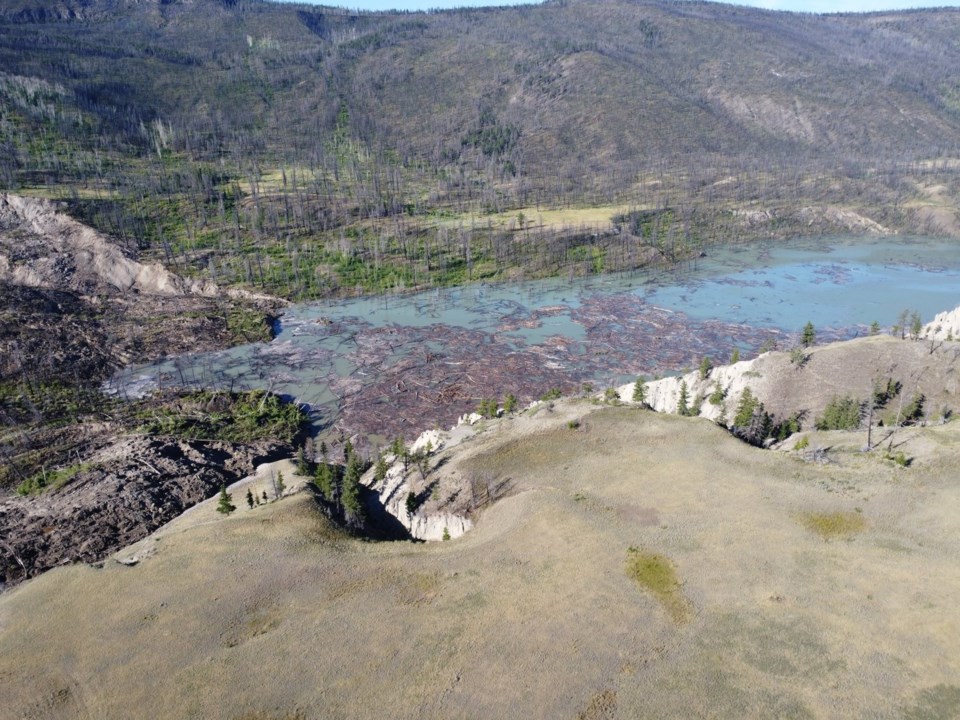A report from a First Nation says the massive Chilcotin River landslide in the B.C. Interior last year revealed shortfalls in communication and co-ordination of the emergency response from provincial and federal governments.
The Tsilhqot'in National Government's report says it had to overcome "jurisdictional confusion," and that the province "struggled" to share information about the slide.
It says that as a result, the First Nation's own emergency management was "largely hamstrung" when trying to help residents due to a lack of up-to-date information.
In a joint written response, the B.C. ministries of Emergency Management and Water, Land and Resources Stewardship say they will be reviewing the report's findings and calls to action.
The federal government did not provide a response immediately after the report's release.
The July 2024 landslide blocked the Chilcotin River for several days, resulting in the Cariboo Regional District declaring a local state of emergency while 34 parcels of land were evacuated.
The slide temporarily dammed the river when salmon were travelling upstream to spawn, and the First Nation says a task force examining the effect on the fishery is proof that Indigenous-led stewardship results in a quick, effective response.
“The Tsilhqot’in National Government was a valuable partner in responding to the massive landslide that occurred along the Chilcotin River in the summer of 2024," the provincial response to the report says.
"We recognize this was a unique event, and many governments including First Nations and local authorities, are looking to take learnings from experiences through Chilcotin landslide emergency response and recovery."
The First Nation says it is calling on both the provincial and federal governments to integrate their consultation, co-operation and consent protocols to make sure that "Indigenous jurisdiction is respected even in urgent emergency response."
"This isn't about pushing other governments out," says the nation's executive director Jenny Philbrick at a Vancouver news conference on the report's release Monday. "It's about us taking the lead and working collaboratively with B.C. and Canada.
"We have a quote that we use quite often in our territories: 'Tsilhqot’in problems need Tsilhqot’in solutions,' and that is exactly what this is."
Key among the complaints, the report says, was the lack of information sharing.
"While the provincial government helpfully arranged helicopter viewings for chiefs and senior staff, the province was reluctant to share monitoring data on a government-to-government basis with the (Tsilhqot'in National Government)," the report says.
These experiences mirrored what they saw during the early response to the COVID-19 pandemic, with "the siloed nature of provincial emergency response," the report says.
While information-sharing protocols were negotiated with health authorities then, that didn't carry over to the landslide situation, the report says.
The First Nation also says the uncertain and delayed funding from the federal government forced it to move forward with "urgent and vital actions to steward the salmon" without guarantee of backing from Ottawa.
Chief Francis Laceese of the Tl'esqox First Nation, which is a member of the Tsilhqot'in nations, says he is confident that both the federal and provincial governments will respond positively to the report's findings and call for action.
"I think we have a pretty good working relationship with the government that's there," Laceese says.
He says government support for the salmon task force has to continue given the importance of the fish species for the Tsilhqot’in people. "I think it's just a matter of sitting down and see where things are at.
"That's who we are as Tsilhqot’in, with Aboriginal rights and title very important to all this area (that) belongs to us." he says. "Even the salmon know that. They come right back to where they're born every year."
This report by The Canadian Press was first published Feb. 24, 2025.
Chuck Chiang, The Canadian Press
